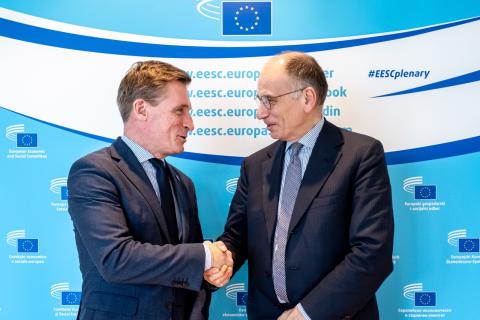European Economic
and Social Committee
The future European single market needs a new geopolitical focus
At the March plenary of the European Economic and Social Committee (EESC), former Italian prime minister Enrico Letta made clear that the European single market was first and foremost about people and – 30 years after its launch – needed to focus on Europe’s strategic autonomy and matters such as defence, telecommunications, energy and finance.
The strategic rethinking of the EU single market is now a necessity: the world has changed over the past 30 years and the single market needs to be adapted to the new international landscape, former head of the Italian government Enrico Letta said at the EESC plenary session debate on 20 March 2024.
Presenting the key idea behind his High-Level Report on the Future of the Single Market, Mr Letta, the current president of the Jacques Delors Institute, stressed that the future single market needed to have a geopolitical approach and focus on Europe’s strategic autonomy and pillars such as defence, telecommunications, energy and finance.
The geopolitical landscape is now totally different to what it was 30 years ago. The mission today is to consider what consequences the new world scenario has for the single market and its future. We need to have a new approach and include matters such as defence and enlargement,
he said.
EESC president Oliver Röpke stressed that the success of the single market could not just be measured in economic terms but must also mirror European citizens' hopes and wellbeing: At the EESC we believe that the single market is fundamentally about people and the right to move also means the freedom to stay.
Mr Letta pointed out that the single market was both about people and for people. Economic competitiveness had to go hand in hand with social protection, and the freedom to move and the right to stay were part of the same freedom: The brain drain is having a devastating impact in some countries. We have to address the freedom to stay and freedom to come back. Today it is a one-way ticket only, and this is affecting competitiveness and creating a big problem in Europe.
Mentioning the need to protect and improve the future single market, Mr Röpke added: Any long-term plan for the single market should focus on both social and economic convergence, tackling inequalities and social disparities that threaten European integration. This calls for a collective effort involving regions, local authorities, businesses, and civil society to build a socially conscious Europe that leaves no one behind.
On behalf of the Civil Society Organisations Group, the president of the EESC European Semester Group Luca Jahier highlighted the fact that the single market could not only be about energy, telecommunications and artificial intelligence, the capital markets union and defence. The EU also needed a social pillar as a condition for its competitiveness and prosperity.
The president of the EESC’s Employers Group Stefano Mallia said that the future of the single market had to start ‘tomorrow’, not in a few years’ time, pointing out that EU had to cater for all businesses, but also focus on innovative ones that would create growth and jobs.
Finally, on behalf of the EESC’s Workers Group, its vice-president Philip Von Brockdorf underlined that the capital markets union was fundamental to completing the single market, but the EU had focused on low-hanging fruit without tackling the real issues of national capital markets and the inward focus of some countries.
Background
The High-Level Report on the Future of the Single Market was requested by the European Council on 30 June 2023. The former head of the Italian government, Enrico Letta, was tasked with collecting the positions of European and national bodies as well as employer, trade union and civil society organisations. The main objective was to come up with concrete and ambitious recommendations.
The report is expected to be discussed at the European Council’s meeting in April 2024 and serve as a basis for action from the future presidencies of the Council, the next European Commission and the Member States.
Launched more than 30 years ago on 1 November 1993, the single market is European integration’s most valuable asset: one territory without any internal borders or other regulatory obstacles to the free movement of people, goods, services and capital, the so-called ‘four freedoms’.
However, although the single market has made the everyday lives of Europe’s people and businesses easier, its benefits are not always realised because the rules are sometimes not known, not implemented or in any case undermined by a number of different barriers.
Work organisation
Downloads
-
The future European single market needs a new geopolitical focus
